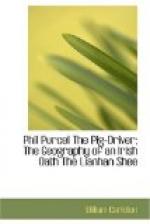“So thin, afther all, if the head hadn’t been an me, I wouldn’t be a favorite wid you?—ha, ha, ha!”
“Get out wid you, and spake sinse. Throth, if you don’t say aither ay or no, I’ll give myself no more bother about it, There we are now wid some guineas together, an’—Faix, Pettier, you’re vexin’ me!”
“Do you want an answer?”
“Why, if it’s plasin’ to your honor, I’d have no objection.”
“Well, will you have my new big coat made agin Shraft?” (* Shrovetide)
“Ay, will I, in case you do what I say; but if you don’t the sarra stitch of it ’ll go to your back this twelvemonth, maybe, if you vex me. Now!”
“Well, I’ll tell you what: my mind’s made up—I will take the land; an’ I’ll show the neighbors what Pether Connell can do yit.”
“Augh! augh! mavoumeen, that you wor! Throth I’ll fry a bit o’ the bacon for our dinner to-day, on the head o’ that, although I didn’t intind to touch it till Sunday. Ay, faix, an’ a pair o’ stockins, too, along wid the coat; an’ somethin’ else, that you didn’t hear of yit.”
Ellish, in fact, was a perfect mistress of the science of wheedling; but as it appears instinctive in the sex, this is not to be wondered at. Peter himself was easy, or rather indolent, till properly excited by the influence of adequate motives; but no sooner were the energies that slumbered in him called into activity, than he displayed a firmness of purpose, and a perseverance in action, that amply repaid his exertions.
The first thing he did, after taking, his little farm, was to prepare for its proper cultivation, and to stock it. His funds were not, however, sufficient for this at the time. A horse was to be bought, but the last guinea they could spare had been already expended, and this purchase was, therefore, out of the question. The usages of the small farmers, however, enabled him to remedy this inconvenience. Peter made a bargain with a neighbor, in which he undertook to repay him by an exchange of labor, for the use of his plough and horses in getting down his crop. He engaged to give him, for a stated period in the slack season, so many days’ mowing as would cover the expenses of ploughing and harrowing his land. There was, however, a considerable portion of his holding potato-ground; this Peter himself dug with his spade, breaking it as he went along into fine mould. He then planted the seed—got a hatchet, and selecting the best thorn-bush he could find, cut it down, tied a rope to the trunk, seized the rope, and in this manner harrowed his potato-ground. Thus did he proceed, struggling to overcome difficulties by skill, and substituting for the more efficient modes of husbandry, such rude artificial resources as his want of capital compelled him to adopt.




